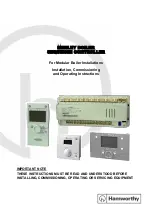44.4.6 Slave Mode Operation Constraints
Slave mode logic shift register is buffered. This allows data streaming operation, when
the module is permanently selected and data is shifted in with a constant rate.
The transmit data is transferred at second SCK clock edge of the each frame to the shift
register if the SS signal is asserted and any time when transmit data is ready and SS
signal is negated.
Received data is transferred to the receive buffer at last SCK edge of each frame, defined
by frame size programmed to the CTAR0/1 register. Then the data from the buffer is
transferred to the RXFIFO or DDR register.
If the SS negates before that last SCK edge, the data from shift register is lost.
44.4.7 Interrupts/DMA requests
The module has several conditions that can generate only interrupt requests and two
conditions that can generate interrupt or DMA requests. The following table lists these
conditions.
Table 44-104. Interrupt and DMA request conditions
Condition
Flag
Interrupt
DMA
End of Queue (EOQ)
EOQF
Yes
-
TX FIFO Fill
TFFF
Yes
Yes
Transfer Complete
TCF
Yes
-
TX FIFO Underflow
TFUF
Yes
-
RX FIFO Drain
RFDF
Yes
Yes
RX FIFO Overflow
RFOF
Yes
-
Each condition has a flag bit in the module Status Register (SR) and a Request Enable bit
in the DMA/Interrupt Request Select and Enable Register (RSER). Certain flags (as
shown in above table) generate interrupt requests or DMA requests depending on
configuration of RSER register.
The module also provides a global interrupt request line, which is asserted when any of
individual interrupt requests lines is asserted.
Chapter 44 Serial Peripheral Interface (SPI)
K22F Sub-Family Reference Manual , Rev. 3, 7/2014
Freescale Semiconductor, Inc.
1085


















